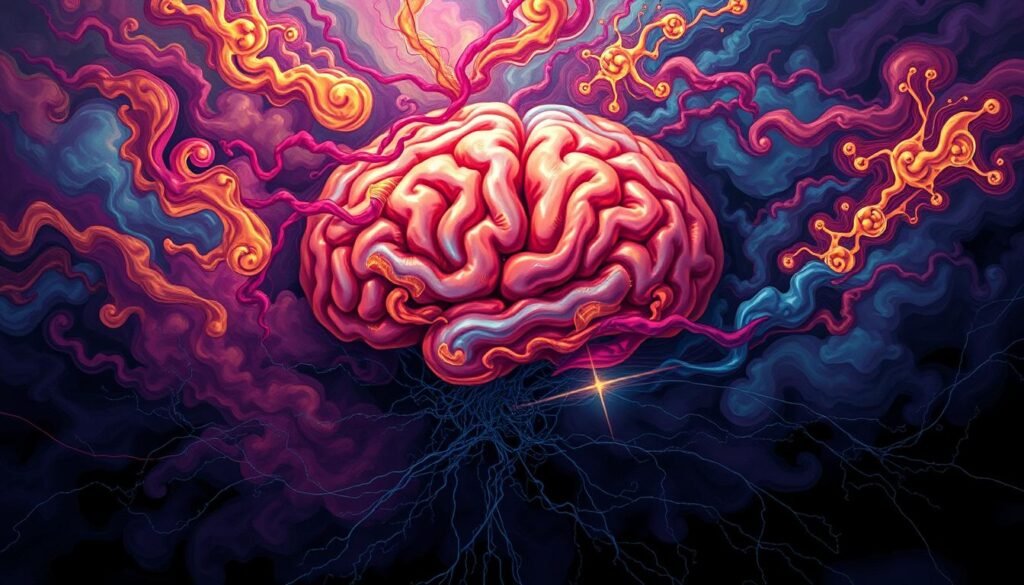About 20% of people who drink alcohol say they feel anxious or depressed because of how alcohol affects brain chemicals. This important fact shows how closely alcohol and anxiety are linked, affecting mental and emotional health. Drinking might seem like a quick way to ease anxiety, but it can actually cause more anxiety and dependence over time.
It’s crucial to understand how alcohol use disorder and anxiety affect each other for better anxiety management. This article looks at the close ties between alcohol and anxiety. We’ll talk about “hangxiety,” how alcohol changes the brain, and why it’s important to know if you have both disorders. You’ll learn helpful ways to deal with these issues by the end of this read.
Key Takeaways
- About 40% of individuals with alcohol use disorders also meet criteria for anxiety disorders.
- The cycle of self-medication often exacerbates both anxiety and alcohol dependence.
- Reducing alcohol intake can lead to observable improvements in anxiety symptoms.
- Sleep disturbances due to alcohol can lead to increased anxiety levels, especially the day after drinking.
- Having a routine and practicing self-care can alleviate anxiety and improve emotional well-being.
- Recognizing the signs of alcohol use disorder is crucial in addressing co-occurring anxiety disorders.
Understanding the Connection Between Alcohol and Anxiety
Alcohol and anxiety have a complicated relationship. Many people with anxiety drink alcohol to feel better. But this can lead to problems. About 7 percent of Americans have social anxiety. And 20 percent of them also struggle with alcohol addiction. This habit can make anxiety worse over time.
Drinking a lot over many years can lead to anxiety problems. Drinking in moderation may not cause anxiety. But drinking too much has serious effects. Alcohol withdrawal can make anxiety symptoms like a fast heartbeat and shaking worse.
The effects of alcohol on mental health can last for hours or even into the next day. Hangovers can make anxiety stronger. Having five or more drinks in a day can mean an alcohol problem. Studies show a link between heavy drinking and anxiety. This shows in the higher chances of having both conditions.
| Anxiety Disorder | Adjusted Odds Ratio (ECA) | Adjusted Odds Ratio (NCS) | Adjusted Odds Ratio (NSMH & WB) | Adjusted Odds Ratio (NESARC) |
|---|---|---|---|---|
| Agoraphobia | 2.7 | 2.6 | 2.3 | 3.6 |
| Generalized Anxiety Disorder | – | 4.6 | 3.3 | 3.0 |
| Panic Disorder | 4.1 | 1.7 | 3.9 | 3.5 |
| Any Anxiety Disorder | 2.1 | 2.6 | 3.3 | 2.7 |
It’s important to know how alcohol affects mental health. Knowing the impact can help people find healthier ways to cope. Being aware helps people make better choices.
The Role of Alcohol in Mental Health
Alcohol’s role in mental health is complex. It often makes existing problems worse and can create new ones. People who drink a lot regularly are more likely to have mental health issues. Heavy drinking is linked to more anxiety and depression. It starts a harmful cycle of using alcohol to cope.
Drinking a lot can lead to risky actions, like self-harm or thinking about suicide. A lot of people with anxiety say alcohol makes it worse, not better. Using alcohol to deal with anxiety can lead to drinking even more. This increases the risk of becoming dependent on alcohol. Anxiety and Alcohol Use Disorder (AUD) often happen together. This makes treatment harder.
We need to understand alcohol’s wide effects on mental health. Advice says men and women should drink less than 14 units a week. This can lower the risks of alcohol problems. People with depression who stop drinking often feel better in weeks. It shows cutting down on alcohol can help. Drinking responsibly is key. Spotting signs of AUD early can improve mental health.
What Is Hangxiety?
Hangxiety is the anxiety you feel after drinking alcohol. It happens because dopamine levels drop after drinking. People drink to feel less anxious, but end up feeling worse. This creates a tough cycle of drinking and anxiety.
Defining Hangxiety and Its Symptoms
Hangxiety has signs that affect your mind and body. They include:
- Irritability
- Nausea
- Intense worry over actions taken while drinking
- Restlessness or inability to focus
Those with anxiety or depression may feel hangxiety more. Alcohol withdrawal makes the heart beat faster. This can make anxiety worse.
The Cycle of Drinking and Anxiety
Drinking and anxiety are in a dangerous cycle. People drink to ease anxiety, which feels good for a bit. But, when the effect wears off, anxiety gets worse. This traps them in a repeating loop:
- Drinking to alleviate anxiety, creating a fleeting sense of relief.
- Experiencing hangxiety as withdrawal kicks in.
- Increasing alcohol consumption to manage the heightened anxiety, solidifying dependence.
To avoid hangxiety, it’s best to drink in moderation. Women should limit to one drink a day. Men should stop at two.
How Alcohol Affects Anxiety Symptoms
Knowing how alcohol and anxiety symptoms connect is key for better mental health. Alcohol triggers changes in the brain, affecting our brain chemistry. This can worsen anxiety over time. The impact of alcohol is complex, causing both short and long-term issues.
Physiological Changes in the Brain
Drinking alcohol changes how the brain works. It affects GABA, a neurotransmitter that helps us relax. At first, alcohol may lessen anxiety, but withdrawal can raise anxiety levels. This can make the heart race, thoughts restless, and increase feelings of fear.
The Impact of Alcohol on Neurotransmitters
Alcohol affects neurotransmitters long-term, not just for a moment. This can lead to anxiety disorders. Research shows a link between alcohol and increased anxiety. For instance, one-third of people with alcohol problems also suffer from severe depression. Also, 40% of alcoholics experience terrifying panic attacks.
It’s important to understand how alcohol use and anxiety are linked. This knowledge helps in finding ways to manage both issues. Recognizing the effects of alcohol on the brain is crucial in dealing with alcohol addiction and anxiety disorders.

| Statistics | Findings |
|---|---|
| Depression and Anxiety | More than one out of every three alcoholics has experienced episodes of intense depression and/or severe anxiety. |
| Sadness Reports | Approximately 80 percent of alcoholics report periods of sadness in their medical histories. |
| Panic Attacks | At least 40 percent of alcoholics admit to experiencing one or more intense panic attacks. |
| Suicide Risk | The risk of death by suicide among alcoholics is estimated to be 10 percent or higher, particularly during high depression periods. |
| Alcohol-Induced Symptoms | Long-term treatment for independent anxiety or depressive disorders may not be necessary if psychiatric symptoms are alcohol-induced. |
| Panic Disorder Association | 25% of people who sought treatment for panic disorder had a history of alcohol dependence. |
Recognizing Alcohol Use Disorder (AUD)
Understanding alcohol use disorder (AUD) means knowing its signs and context. Spotting it early helps with intervention and support. Remember, AUD affects millions and often comes with other mental health issues.
Signs of AUD
Spotting the signs of alcohol use disorder is crucial. Here are behaviors that indicate AUD, helpful for the person and their loved ones:
- Increased tolerance, needing more alcohol to feel the same effects.
- Withdrawal symptoms like anxiety, sweating, or shaking hands when not drinking.
- Strong cravings and a desire to drink despite bad outcomes.
- Drinking to deal with stress or emotional issues.
- Trying and failing to reduce or control alcohol use.
When drinking causes major problems, it might be AUD. About 18 million adults in the U.S.A. face this issue, showing why it’s key to notice these signs early.
Identifying Co-occurring Disorders
Many with AUD also have other disorders, making treatment and recovery complex. Often, they suffer from mental health conditions such as:
- Depression
- Anxiety disorders
- Post-traumatic stress disorder (PTSD)
Nearly half of those with AUD also deal with anxiety. This overlap means treatment must tackle both alcohol and mental health issues. It’s essential to grasp this complexity for effective treatment plans.
Coping Mechanisms for Managing Anxiety
Anxiety disorders are common among adults in the US. Finding good coping methods can greatly boost one’s mental health and daily life. Choosing healthy lifestyle habits is a strong way to avoid alcohol and manage anxiety more effectively.
Healthy Alternaries to Alcohol
Rather than using alcohol, there are many healthy options available. Adding regular exercise to your routine has many benefits. For instance, regular physical activity can cut anxiety symptoms by 20-40%. Below are some healthy choices:
- Trying out physical activities like jogging, yoga, or cycling.
- Getting into hobbies that bring peace, such as painting or gardening.
- Choosing herbal teas and non-alcoholic drinks at social events.
Mindfulness and Stress Reduction Techniques
Mindfulness is key in fighting anxiety effectively. Doing meditation, deep breathing, and muscle relaxation exercises can keep you calm. These acts dramatically lower panic and anxiety levels. Consider these mindfulness techniques:
- Practice deep breathing by inhaling for four counts, holding, and then exhaling for four.
- Make time for meditation every day, even if it’s just a few minutes.
- Add humor to your day to boost your spirits and reduce stress.

Treatment Options for Alcohol Dependence and Anxiety
Treatment options vary for people dealing with alcohol dependence and anxiety. They are tailored to match personal needs. This approach offers complete mental health care. It tackles both issues at once. Different therapies help patients find ways to deal with their problems.
Medications for Anxiety
Several medications for anxiety are key in treating those with alcohol use problems too. Antidepressants and benzodiazepines are common but need careful use. This is due to their potential risky mix with alcohol.
FDA-approved meds like naltrexone and acamprosate help reduce alcohol cravings. For example, naltrexone can be given as a monthly shot called Vivitrol. This may make sticking to treatment easier. Another choice, Disulfiram, causes bad reactions if alcohol is drunk.
Therapeutic Approaches for Co-occurring Conditions
Therapies such as cognitive-behavioral therapy (CBT) look into the root problems of AUD and anxiety. They help patients rethink their views and spot stress triggers. Motivational enhancement therapy boosts patients’ confidence and willingness to change.
- Behavioral interventions, like contingency management, reward sticking to treatment.
- Family counseling improves support, which can lead to better results.
- Peer support groups like Alcoholics Anonymous or SMART Recovery offer a sense of community.
Managing alcohol dependence and anxiety well means healthcare providers, patients, and support groups must work together. Adding in practices like yoga or meditation can also help. They support overall mental health and recovery efforts.
Self-Care Strategies for Better Mental Health
Effective self-care strategies are key to better mental health and controlling anxiety. Creating a regular mental health routine helps. People notice lower anxiety and feel generally better.
Establishing a Healthy Routine
Having a daily routine helps a lot with anxiety. Studies show sticking to a schedule can improve mental health by 35%. Activities like exercise and meditation can cut anxiety by 25-30%.
Relaxation practices, such as yoga or mindfulness, also help reduce stress. This makes daily routines more useful for managing anxiety.
The Importance of Sleep and Nutrition
Good sleep is crucial for mental health. Those with steady sleep patterns feel 40% less anxious compared to others. Sleep helps with making decisions and managing emotions.
Nutrition also affects anxiety. A diet high in omega-3 fatty acids may reduce anxiety risk by roughly 30%. A balanced diet supports good sleep and anxiety management, boosting mental health.

Exploring a Holistic Approach to Treatment
A holistic approach to treatment focuses on more than just addiction. It aims to improve overall wellness. It includes physical health and mental well-being for a full recovery journey. Physical activity is essential for mood improvement and stress reduction.
Integrating Physical Activity and Well-Being
Exercise releases endorphins, which help lower anxiety and boost mood. This is especially helpful for those dealing with alcohol use and mental health issues. Physical activity plays a key role in holistic treatment options:
- Approximately 70-90% of individuals in substance abuse treatment programs report co-occurring mental health issues.
- Holistic therapy has been shown to improve treatment retention rates by up to 15%, encouraging a more engaged recovery process.
- Those participating in holistic programs are 30% more likely to maintain long-term sobriety compared to conventional therapy participants.
- Incorporating mindfulness practices can reduce cravings by 25-40%, aiding in effective recovery.
- Studies suggest nearly 60% of participants in holistic programs experience a significant decrease in anxiety symptoms.
The integration of wellness practices like yoga, meditation, and nutritional counseling is crucial. Nearly 75% of holistic programs use nutritional counseling to boost health. These integrative therapies have shown a 30% reduction in stress, aiding long-term recovery.
| Holistic Treatments | Benefits | Effectiveness |
|---|---|---|
| Physical Activity | Boosts mood, reduces anxiety | Significantly improves physical health |
| Mindfulness Meditation | Enhances focus, reduces stress | 30% decrease in stress levels |
| Nutrition Counseling | Improves overall wellness | 75% programs report positive outcomes |
| Yoga | Aids in rehabilitation | Effective for many individuals |
| Art and Music Therapy | Enhances coping skills | 50% increase in post-treatment skills |
Using holistic treatment options addresses alcohol dependence and supports wellbeing. This multi-dimensional approach goes beyond sobriety. It promotes a healthier, more fulfilling life.
Conclusion
Understanding how alcohol and anxiety are connected is vital for better mental health. Studies show that half of the people getting help for alcohol problems also have anxiety disorders. It’s clear that dealing with alcohol and anxiety needs a well-rounded plan.
This plan involves knowing how alcohol affects our brains and how it changes our mood. With this knowledge, people can make smarter choices. They learn how to cope better as they work towards recovery.
Treatments like anxiety medicines and cognitive-behavioral therapy (CBT) really help those struggling with anxiety and alcohol use. Adding in self-care, like exercise, good sleep, and eating well, also makes a big difference. These actions help create a positive environment for overcoming alcohol dependency.
Knowing the bad effects of alcohol on anxiety helps people make better choices. When they use proven strategies and build supportive networks, they start a journey to wellness. They’re working towards a future with emotional and physical health.